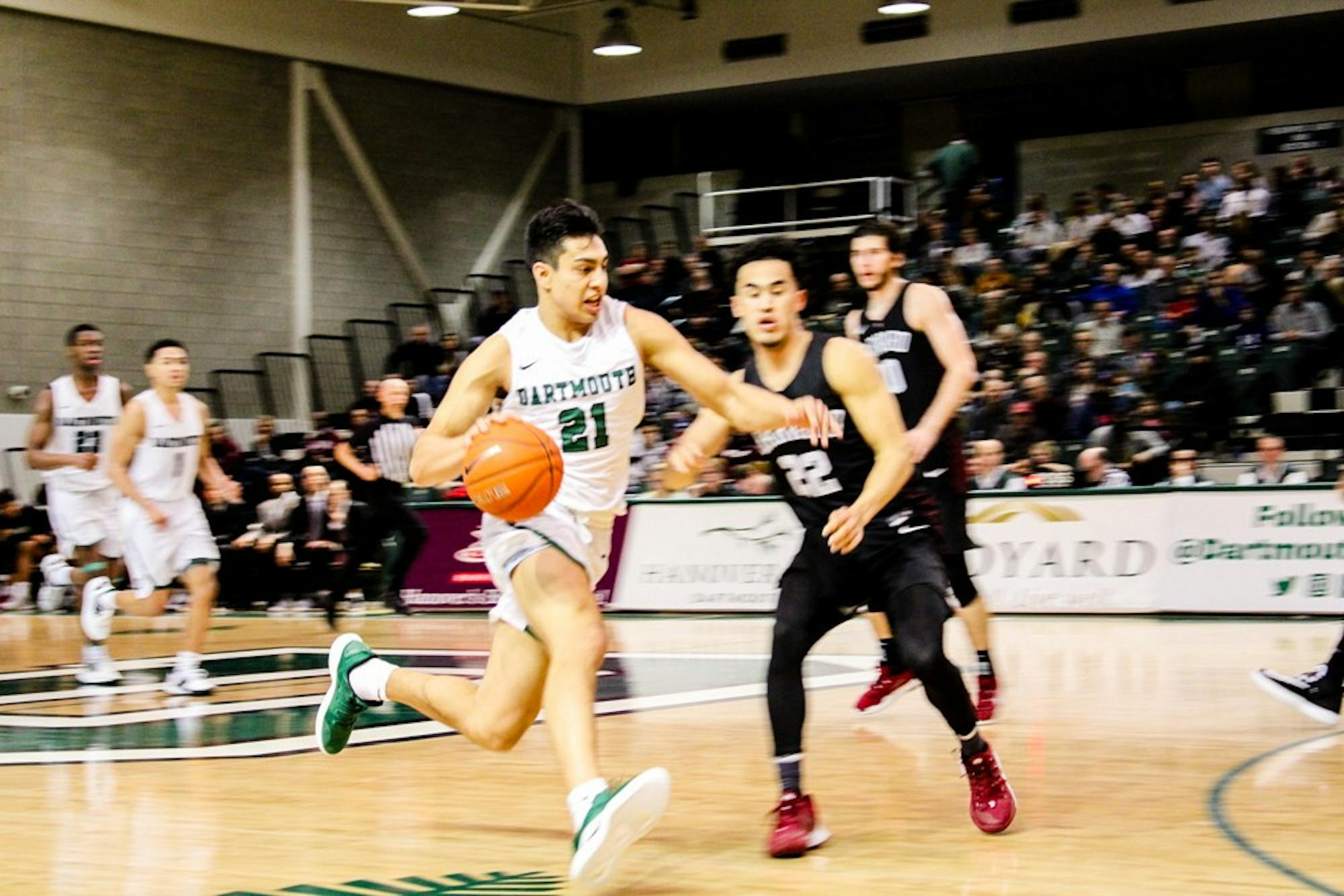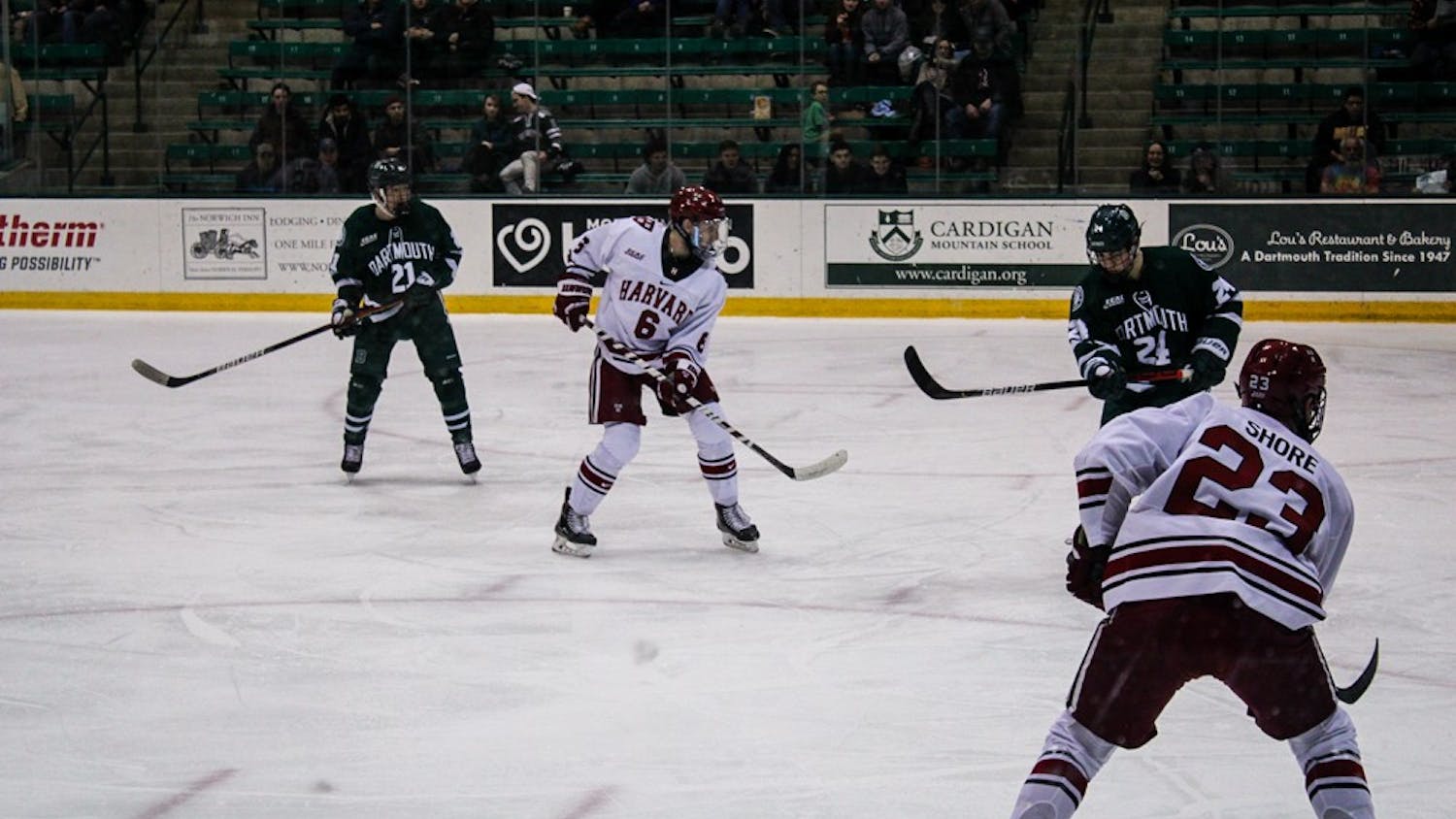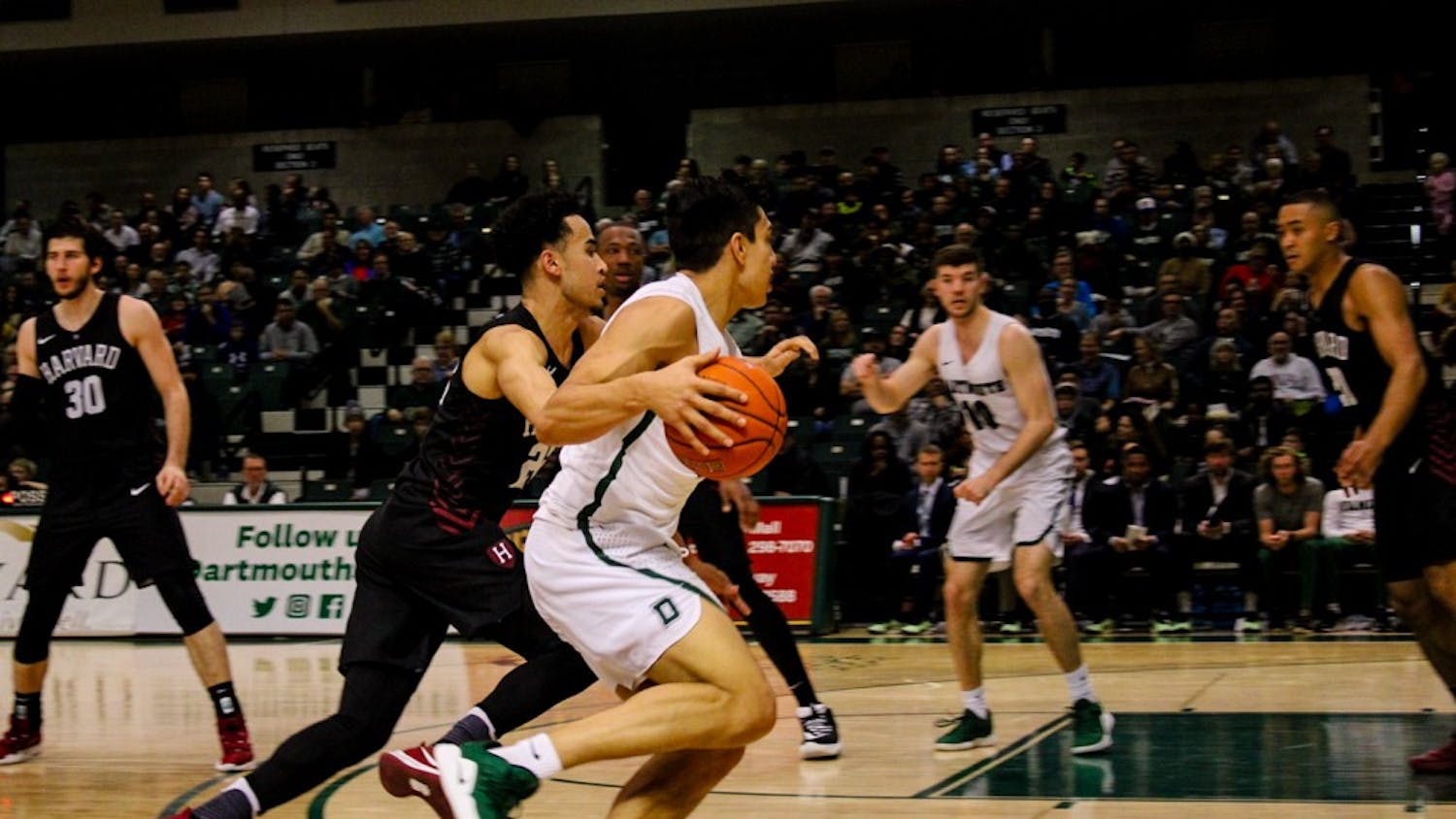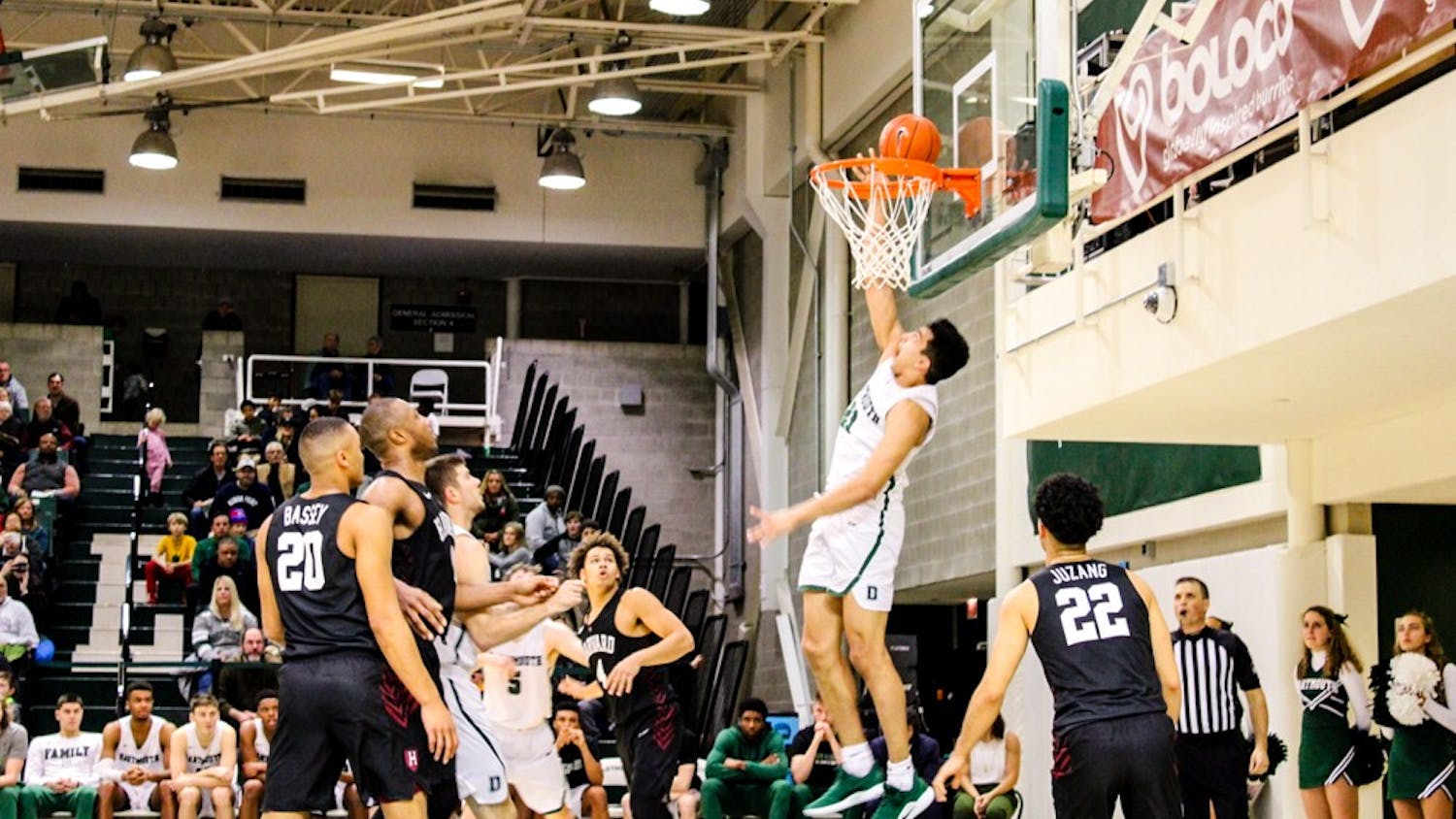At some point, the Dartmouth men’s basketball team is going to have to turn its bursts of success into wins.
The Big Green exited its most recent Ivy League weekend slate the same way it entered: winless. With a nail-biting 67-65 loss at Brown University on Friday and a much-less-close 75-57 defeat to Yale University on Saturday, Dartmouth now finds itself 7-14 on the season, 0-6 in Ivy League play and on a nine-game losing streak.
That is not to suggest that the Big Green has not had success, however. At Brown, the team opened up to an eight-point lead at halftime on the back of an offensive spark, shooting 60 percent from the field while making five-of-seven 3-pointers.
A combination of fouls and turnovers led to the team’s downfall in the second half, however. The Bears forced 18 Dartmouth turnovers and drew 25 fouls; they shot 26 free throws to the Big Green’s five.
“They’re a very athletic group,” Dartmouth head coach David McLaughlin said about Brown earlier last week. “They’re a potentially explosive group. You can’t give them live ball turnovers because they’ll turn those into points.”
On Friday, Brown scored 20 points off of turnovers, including 13 in the second half. A 12-0 run with under six minutes to go sealed the deal, even in spite of a furious and seemingly-quite-common late Dartmouth comeback attempt.
“We watched that sequence as a team,” said James Foye ’20. “They made a couple tough shots, a couple really, really good plays. Basketball, as we know, is a game of runs. A team can get momentum so quickly. It’s basically just knowing that they’re going to make some great plays that you can’t control as much, and then being able to respond quickly and not let it snowball.”
Down 10 with 2:18 remaining, the Big Green cut Brown’s lead to as little as one, as the offense regained its bearings. In a stretch of just over two minutes, Taurus Samuels ’22 and Chris Knight ’21 scored five points each, and a Trevon Ary-Turner ’22 3-pointer cut Brown’s lead to 66-65 with just eight seconds on the clock. When Brown’s Brandon Anderson went one-for-two from the line, Dartmouth had an opportunity to tie the game with a two or go for the win with a three.
Foye took the latter option, getting off a quick 3 with just under two seconds left. It clanked off the front of the rim as time expired.
“The original play was to get a pass going towards the rim,” Foye said. “They actually zoned up the middle, so we had to change the play on the fly. It’s great to get the two, that was our plan, but in the moment, I think going for the win — going for the jugular — was the play. Obviously, it’s something you think about, especially me. I think about how great it would have been to make it, but hopefully we can get a couple of those to fall later.”
The decision to get the ball into Foye’s hands made sense. He’s been one of the most reliable shooters on the team since he became a full-time starter last season, but his night was rather quiet, scoring just five points on two-of-five shooting, while being charged with four fouls. Regardless, it wasn’t that shot that doomed the Big Green. The four-minute offensive dry spell loomed large.
“When a team is trying to come back, you need to be able to extend the lead a little bit,” Knight said. “And in that stretch, we weren’t able to score, and they came back. We fouled them a lot, and they were slowly chipping away. They made a few big plays that got their energy up. It’s definitely a mental thing. Because we’ve been on a losing streak, we are all like, ‘This isn’t going to happen again.’ And then it happens.”
At Yale on Saturday, Dartmouth again had stretches of success intertwined with offensive sputtering. The Bulldogs opened to a fast start, building a 14-point lead nine minutes into the game.
Dartmouth climbed back into it, however, actually tying the game at 35 about 10 minutes later, again thanks to successful shooting across the score sheet. Eight different players made a bucket in the first half, and this multifaceted attack allowed the Big Green to play toe-to-toe with the Bulldogs, down 40-36 at the intermission. The team had nine assists in the first half, their most in a half since Dec. 18, when they had 11 in the second versus Central Connecticut State University. Perhaps not coincidentally, that was Dartmouth’s last victory.
“That first half is something we’ll watch a lot to see where those assists are coming from,” Foye said. “[We’ll] try to build on that going forward. I think it’s definitely frustrating that that is not always there, but it’s better that it can be there than that it’s never there. Hopefully that’s something we can springboard off of and learn where the difference is.”
Yale cruised to victory in the second half, as Dartmouth once again found itself in foul trouble and offensive disarray. In a roughly eight-minute stretch near the beginning of the second half, the Big Green scored just two points. In the process, the Bulldogs built an 18-point lead, going on to win by that margin.
Despite scoring 17 points and adding six rebounds against Brown, Knight had eight turnovers and four fouls versus Yale. In total, the team had 25 fouls to Yale’s 11. Prior to this weekend, Dartmouth had rarely found itself in foul trouble; in their first 19 games, the team only picked up 25 fouls once, but did so in both games against Brown and Yale.
“I think there’s a little bit of frustration, a little bit of the refs,” Knight said. “I think the refs were calling a lot of ticky-tacky fouls on us. We fed into it through frustration. We would get more of these touchy fouls. At this point, we just need to stay mentally tougher. Sometimes, I also buy into the frustration part and commit a foul for no reason. I think it’s important for me to stay on the floor, so I think I just have to be more mentally aware.”
Perhaps Dartmouth’s only saving grace is that they’ve “had a tough schedule,” as McLaughlin noted last week. Following games on Saturday, only two of the 353 Division I schools have played fewer home games than the Big Green, which just ended a stretch of five of six games on the road.
“It’s always a little harder to play on the road than it is to play at home,” Knight said. “You’re playing in someone else’s environment, and you’re adjusting to — they have a crowd, the refs are being peer pressured by their crowd a little bit. You’re playing against a few factors. And then, this is the gym that they’re comfortable in, that they practice in, that they shoot in all the time. You’re also traveling, while the other team is able to [sleep in their own] bed.”
The schedule will improve, as six of Dartmouth’s eight remaining Ivy League games will be at home, but it could already be too little, too late. Into games on Sunday, they are three-and-a-half games behind the University of Pennsylvania for the crucial fourth spot in the Ivy League standings. Near-perfection will be necessary for the Big Green to earn a spot in the four-team Ivy tournament. Its next test comes Friday, when the team returns home to face Columbia University at Leede Arena.
“We want to be a group that’s tough and together and that competes and executes,” McLaughlin said. “Individuals are going to have up times in games, down moments in games, and you have to pick each other up. The communication has to be together, and you’ve gotta be tough. And then, through that, you have to compete, no matter the scenario [or] the situation.”





